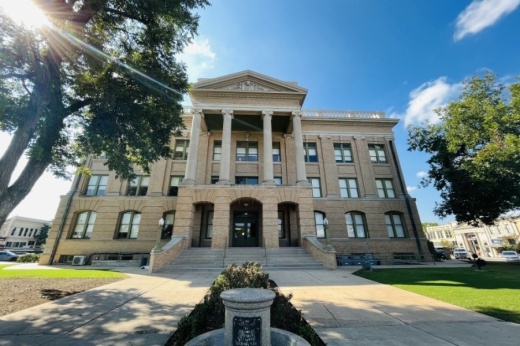The county’s proactive approach prevents or redirects many individuals in the midst of a mental crisis from seeing a jail cell, instead allowing them to receive the appropriate help they need during a critical time.
The breakdown
Williamson County officials discussed the county’s recently implemented strategies for addressing mental health during a Commissioners Court meeting May 7.
At the core of the county’s work, there has been an emphasis on prevention and the appropriate allocation of county services in recent years.
Stephen Hollis, the deputy director of emergency communications for Williamson County, said the county’s 911 dispatch has made strides to “intervene on the frontlines.”
Williamson County has staffed mental health specialists in the county’s 911 dispatch call center since September, Hollis said. These specialists are trained to de-escalate and divert those calls related to mental health, he said.
Rather than sending all the county’s emergency response resources, such as EMS, police and fire units, the specialist is able to determine which resources are required.
“It's cost effective, and it's saving taxpayers money by getting the correct resources out,” said Kathy Pierce, board chair of the Williamson County and Cities Health District. She said booking an individual in jail is one of the most expensive costs for the county.
By diverting first responders, the county saves an average of $1,367 per call, according to county documents. Additionally, the average cost of incarceration is $549 a day with an average stay of five days.
In conjunction with the improvements to dispatch, the county also created a diversion center in 2022.
The facility provides 23-hour crisis observation and psychiatric care while staff locate the appropriate placement for the individual.
Prior to this program, police officers would spend hours looking for a psychiatric hospital bed, transporting individuals to an emergency room or processing them through jail booking, said Mike Maples, a representative with the county’s mental health authority—Bluebonnet Trails Community Services.
Today, officers are back on duty within 15 minutes of taking an individual in crisis to the diversion center. Additionally, most people are either taken on to their next step in care, such as inpatient hospitalization, or, if less serious, released back to their homes for outpatient treatment, Maples said.
“A priority goal of the Williamson County Behavioral Health Task Force has been to divert people who have mental health issues but are not charged with serious offenses from our jail. This diversion center provides better mental health care for our residents and is at a lower cost than incarceration,” Precinct 3 Commissioner Valerie Covey said in a news release when they launched the program in 2022.
What else?
While some cases require the incarceration of individuals with mental health issues, the county has also crafted strategies to provide assistance and support to these individuals.
The county’s competency restoration program, which launched last year, works to provide psychiatric health treatment to inmates who have been deemed incompetent to stand trial. The county’s program has helped expedite the time these inmates remain incarcerated before seeing a judge.
The program includes a psychiatrist, a licensed counselor and other mental health specialists to help guide inmates on their path to competency—a person's ability to make rational decisions and express themselves.
“They can't progress through the system at all; it just stops for them. They sit and we, the taxpayers, get to pay for their care,” Covey said during an update at Commissioners Court May 7. “... We're [now] seeing folks that have sat [in jail] for two or three years being deemed competent in 45 days. ... It's millions of dollars of savings.”
The county also opened its first youth respite program in March 2022. The facility aims to reduce youth interaction with the juvenile correctional system with a 16-bed, short-term residential facility that provides wraparound services for children and adolescents ages 5-17.
Services include therapy, care coordination, family services, psychiatric evaluation, medication management and case management.
“There has been a noticeable increase in the number of individuals with mental health needs entering the justice system,” said Judge Angela Williams, Precinct 2 justice of the peace, in an interview with Community Impact.
Williams said when hearing juvenile cases, usually truancy hearings, she often sees a lack of motivation to attend school stemming from various mental health issues, such as social anxiety.
She explained this trend has led her office to explore and develop specialized programs to address the need within Williamson County’s youth population.
The Precinct 2 Justice Court collaborates with various agencies to make sure judges and decision makers are aware of services available to those in need of mental health resources.
“Becoming familiar with the services available and educating individuals with mental health issues on the services available will improve the justice system to utilize those services,” Williams said.
Some context
Mental Health America data indicates Texas has consistently ranked among the worst states for mental health care.
When considering both youth and adult populations, Texas exhibits a higher prevalence of mental illness and lower rate of access to care, the data shows. Texas has the fifth-lowest number of mental health treatment centers in the nation, according to a recent study by Forbes.
In Williamson County, an estimated 22.8% of adult residents have been at some time in their life diagnosed with depression, according to county health data.
Part of the problem with both routine and emergency care is nationwide shortages in mental health professionals as well as the backlog of rooms available in state psychiatric hospitals, Williamson County Precinct 2 Commissioner Cynthia Long said.
Recent data from the Williamson County Behavioral Task Force highlights how the county has been able to save the taxpayer money through more efficient and effective response to behavioral health issues in the area.
- Since September, the BTCS has staffed five mental health professionals to aid the county’s 911 dispatchers, providing information or assisting with a total of 987 calls.
- The diversion center has been utilized by law enforcement for 497 individuals to date, with at least one person referred to the diversion center daily, according to county data.
- The Williamson County jail-based competency restoration is one of only three similar programs throughout the state, according to a report to commissioners in December. The program has served a total of 19 individuals facing both felony and misdemeanor charges. The estimated cost savings are $3.9 million from a combination of reduced days incarcerated, reduced travel costs to and from state hospitals, and reduced cost in forensic competency re-evaluations.
- The youth respite program has provided services for 83 juvenile admissions since September.
A proclamation read by Covey for mental health month in May stated the average delay between the onset of mental illness symptoms and treatment is 11 years.
“We are constantly asking the question, ‘What is the gap we're trying to fill? What is the need that we still have?’ And of course, there's the quantity of need that we're trying to address,” Covey said.
Williamson County residents are encouraged to know the signs of mental illness and take action:
- Being sad or withdrawn for more than two weeks
- Trying to harm oneself or making plans to do so
- Out-of-control risky behavior
- Changes in mood or weight
- Use of alcohol and or drugs
- Changes in sleep patterns
- Fears and anxiety
“It's easy to access us, either through our hotlines, through 911 or through 988,” Maples said. “There’s no wrong door.”





